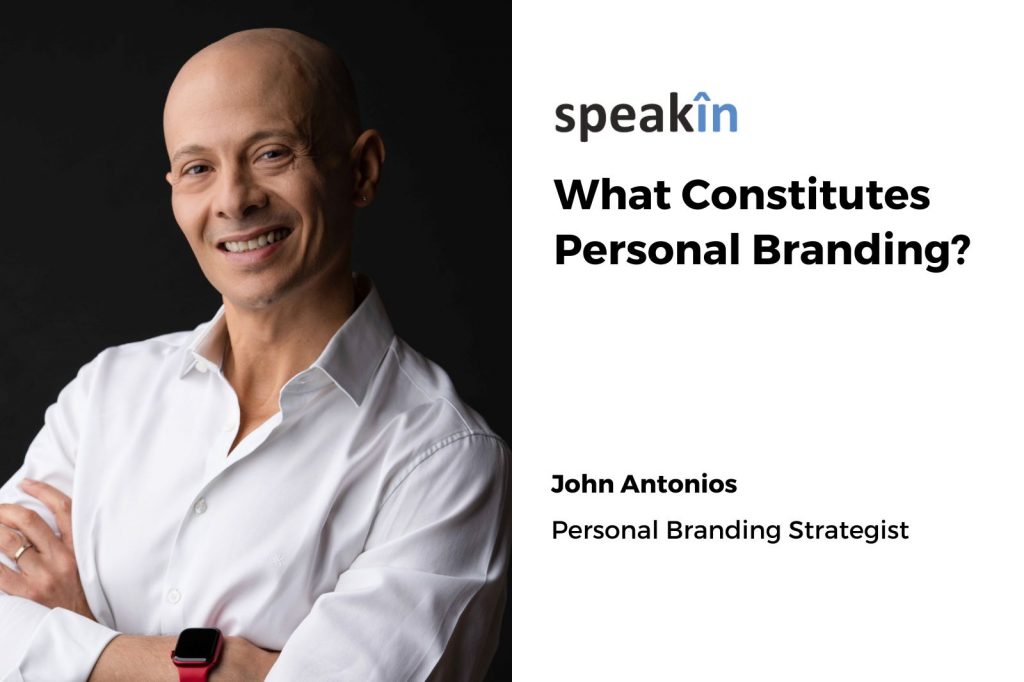What Constitutes Personal Branding?

Why personal branding? What is personal branding all about? What does it include? What makes up a great personal brand? How do I build my personal brand?
Why is Personal Branding Important?
Personal Branding can be encompassed in four quadrants.
- Job market
The competition is fiercer than ever. Regardless of where you come from, regardless of which country you originate from, where you relocate it, whatever it is, competition is fiercer than ever.
The pandemic has made it even more so, because of the hybrid model and the high turnover. In fact, 92% of the recruitments have happened through social media. These are stats from LinkedIn and around 73% made successful hires via social media. Because it’s the most common and a very popular tool. One of the key elements for personal branding is to help us stand out in the job market that is overpopulated.
- Perception and Impression
Personal branding is all about that. It’s all about perception and impression. Whatever you have online has to be one and the same with what you have offline. People are influenced by what they see online about you and they expect the same when they meet you in person. Personal branding helps you align these two – online and offline perception.
70% of candidates were rejected because of what they have about themselves online. Imagine 70% were turned down because of what the HR have found about them or the hiring entity have found about them online. Controlling that perception because whether you like it or not, you are a brand.
The question is not whether you are or not, you are. The question is, do you want to take control of this brand or let everybody around you control that brand for you?
- Trust and Authenticity
Being consistent and having a genuine personal brand fosters trust. It helps you build that trust and you become a credible person. I started reading every single book there was out there because personal branding was a new subject to me and I had to build that credibility. I had to build that expertise aside from getting certified. I wanted to know everything that is out there; research, academics and books, everything.
I read everything there is about personal branding and I established credibility. Why did I do all those? Because I wanted to establish trust. I didn’t have a background in marketing and I didn’t have a background in personal branding. So how do I position myself as such? Personal branding will help you build that trust. Statistically speaking, 63% of consumers would buy more from a brand that they trust than a brand that does not communicate authentically or is not transparent.
- Opportunity and networking
Personal branding helps establish and create the foundation for your network. It’s critical in a very competitive job market to establish the network that will help elevate your brand. It will unlock doors for you, it will create opportunities and it will create collaborations. It opens doors. That’s the importance of personal branding. Out of the 122 million people who received interviews with LinkedIn, 35 million of those have gotten hired because of referrals, because of the network. That’s how critical networking is and personal branding helps you unlock that. We’ve established the “why” and I’m sure we can dig in deeper and have multiple elements of “why” even further.
“There’s no denying that personal branding is no longer a luxury. It’s a necessity.”
What Constitutes Personal Branding?
What makes up a personal brand? What are the elements that make up a personal brand?
- Presence
Having presence; both online and offline, it has to reflect who you are. This is who youI are everywhere, online and offline. This is how you communicate. There has to be a consistency between online and offline. It has to reflect your values, your beliefs, your behaviors, everything about you. Presence is critical and it’s everywhere, all the time.
- Four C’s
Clarity: You need to be clear about what you’re trying to communicate about your brand online. You can’t be a brand that’s about everything. You can’t please everybody with your brand messaging. That’s not personal branding and this is the distinction. There’s something out there is called reputation management or image brand management in that perspective or image management.
Personal branding is not that there’s a personal element to it. I’m not creating something out of you that’s not there. I’m branding what is there. The difference between an image consultant is that an image consultant is trying to create something that’s not necessarily there, something to please an audience. And personal branding is the other way around; from what I have, I am building a brand that will address a particular segment of the audience, not everybody. We’re not running with personal branding for a pageant. I’m not trying to win Mr. World by doing personal branding or running for president or anything else.
I’m not trying to appease everybody. I have to have, just like any brand, a target audience. The clarity of my message is extremely important. I need to be very specific about what I’m trying to communicate with my brand, online and offline.
Consistency: The message, despite the platform you’re using online, offline, different social media platforms, there has to be a consistency in the message. You can’t be about this today and about that tomorrow. But, it does not mean that your brand does not evolve. Your brand has to evolve otherwise just like any brand, any brand that you can think of, it will die.
So it has to evolve, but it’s consistent in its messaging and it evolves in a way that matches what the brand stands for. Now I have to evolve into, how do I communicate online, that same message. If you think of other brands that are not individuals, we can have infinitely many stories about this. The history of Nokia, Nokia was dominant in the mobile industry and they were very late to enter the smartphone industry. Apple in the phone industry became dominant. Evolution of your brand is important, but consistent, evolution does not contradict consistency.
Consistency is about having the same values, the same message being delivered across different times, evolving with you as you evolve, as your brand evolves.
Constancy: I have an article written out there that’s called, and I don’t know if the slogan is also common in Asia, but you know Pringles, the chips, it has a slogan, once you pop you can’t stop. I have an article that says personal branding, once you pop you can’t stop, because that’s exactly how I think of personal branding and how you need to think of personal branding. Personal branding is not setting things up once, and you know I’m all set and that’s it, I leave it.
Credibility: Without credibility, you have no personal brand. Credibility is built. You earn credibility. So before you claim to be an expert, be humble enough to say you’re learning. Be humble enough to say it’s just a start. I did that for a year before I received my first call.
My first client was after one year of nothing. I resigned in January 2010 and. I got my first client in January 2011. That was continuous effort for a year and my first client was Microsoft. They saw and they called me and I have a presentation called “The Call” and it’s obviously about personal branding. That was the first time I hear somebody saying, “Is this John Antonios, the personal branding strategist?”
“It took a lot of effort but it’s doable.”
- Authenticity
Last thing that builds on credibility, is authenticity. There is another article I’ve written about this particular element.
There is only one you, You don’t wear multiple masks. that is different than at work, with friends, with family, or with relatives. That’s very tiring. There’s one you, no mask.
One you and it takes a lot of courage, a lot of vulnerability, a lot of humility to work on the one brand, the one you, a consistent. You don’t have time to work on multiple “yous”. One you is hard enough. But it’s worth it. Everybody else is taken, so one you is worth it.
Don’t try to be anybody else. Don’t try to imitate anybody in your brand. Authenticity is key to what consists or constitutes a personal brand.
Why is Consistency and Constancy so Important?
A learning point from John’s setback.
I’ll share with you about a particular failure of mine. My brand has evolved tremendously since 2010 when I decided to go into personal branding. I wasn’t an assessor then, I wasn’t a coach then. These have been added to my arsenal, and have been added to my repertoire of helping people to develop their personal brand.
I’ve utilized these tools, but the failure, I’ve dropped the ball when it came to maintaining my brand. I stopped sharing content, which gave me all the fame. So at one point in time, my blog was from the top 10 blogs in the Middle East.
My articles were translated into multiple languages and they’re published in certain books. This was what built my brand, but then I closed the lid on my personal branding books. I said, you know, I got it, I got all the attention, and it’s true, I have all the attention that I was hoping for.
But at one point, you get yourself limited into this box of pringles. So in that sense, I have failed. If you look at my website now, you’d see a person, maybe with a little more weight because that’s a website that was made 14 years ago. Now, I still look the same. I didn’t have hair then. But still, there’s a mismatch from what you see today. If you find this website, the articles still make sense today, but there are some articles that don’t, for example, Twitter that I wrote about in one of the blog posts is no longer the Twitter that it is today.
That’s why I’ve dropped the ball and I know that. I know how I’ve failed my brand. I’m very comfortable sharing this with you, because I don’t want you to make the same mistake. Now I’m revisiting everything, and I’m developing a new website and all that.
But still, it shouldn’t have come at a dead end when it comes to what I did to my personal brand in terms of consistency. From a person who’s blogging, at least on a weekly basis, to tweeting, to everything, to nothing.
Consistency is key to maintaining your personal brand and the constancy that I’ve had for the first three years of my personal brand has given me everything that I have today.
I populated the first four pages of Google. If you look at John and Tony’s, I had four other people that were called John and Tony’s when you Google. I drowned their name. It’s literally called drowning their name.
They no longer exist in the first four pages of Google because of content, because of what I’m putting out there, because of my engagement. But now, if you do it again, you’ll see these names pop up.
Because, again, if you don’t keep pushing them down, they’re going to rise up again. So constancy is key.
How To Build Your Personal Brand: 3Ds
- Define
Define is the first stage of building your brand. You need to define your brand.
Before I know what I’m building, I’m defining it. Am I building a castle? Am I building a four-story building? What am I building? That’s how you need to think and defining has a couple of elements that you need to think about.
Identity: identify yourself. How you define yourself, your values, your beliefs, what you think of yourself, everything.
It’s as if you’re looking at yourself in the mirror and there’s nobody there and you’re saying to yourself, what you see, these are my values, these are my beliefs, these are my convictions, this is my passion. This is what I like to do. Identify yourself.
Perception: Then there’s the other side of that mirror. The truth, the truth is perception. Perception is how others see you. Remember I said we are not here to please everybody?. A personal brand does not satisfy everybody’s taste.
If you’re evaluating your brand, you need to make sure that you have people that disagree with you, that don’t see eye to eye with you, that actually don’t like you. That means you’re being authentic to yourself and to your brand. So don’t seek everybody’s approval.
Perception is the truth but we’re talking about the perception of the audience that you intend to attract so that’s the audience I care about what they see. So regardless of what your brand stands for, who you are talking to, their perception or actually who you want to talk to, who you want to be your customer. That is the perception that matters and everything else is noise.
Sure, you don’t like how I speak, but I’m not speaking to you. You’re not my target audience. You sound like you’re very alot of fluff, very good for you and I appreciate that, but it doesn’t matter still. So, it’s not about dismissing, but really, that person who’s saying that is not my target audience and I shouldn’t care about that perception, because again, I’m not trying to please everyone.
So perception is important and what they see is the truth. In coaching, what I do, one of the methods that I follow is what’s created by Marshall Goldsmith is stakeholder coaching, meaning you’re only as good as your stakeholders see you.
That’s the truth. If you think of any brand, for example, Apple, they have haters and lovers. For example, Pepsi,, the internal team does a new taste and everybody in the internal team loves it and they think this is the next hit, it goes out to the market and people don’t love it. What does it matter if the internal team likes it? It doesn’t matter.
What matters is what the perception of the people, the audience they intend, says.
Image: You need to close the gap between perception and identity. So you develop your brand image, and that’s your brand. That’s the brand that you would be branding. That’s the personal brand, that’s the image that you need to get to.
How do we do that? One of the gurus of personal branding is William Arruda; Research online, 360 personal brand assessment and write William Arruda next to it. In that assessment, you will get to assess yourself. You will talk about yourself.They’ll give you key things. What do you identify with? Is this you? Is that you? What are the 10 words that describe you? With that same assessment, you distribute to people around you, to people that know you, friends, family, colleagues, people that interact with you regularly and you get what they think of you.
You see how you identified yourself and what they said about you in the same lines. What did they describe you with? And what did you describe yourself with?
And it will be a very, very eye opening exercise for you. One of the things that I captured from this to myself is that people that I sent this to, a lot of them have identified humor as a key attribute of my brand.
That was not from my top 10 at all. So the decision here becomes whether you’re working with a personal branding strategist or a consultant. Humor has been identified as a common factor that everybody sees in you. Is this something you want to keep? Or is this something you want to suppress? This then becomes an interesting question. Is this part of you? Do you want to make it part of your brand? Because it wasn’t how you identified yourself. So now after I have seen this, I started integrating mindfully and consciously humor in my brand. It no longer became something that I do unconsciously. It’s something that I infuse into everything that I do purposefully.
That’s how you close the gap.
- Design
Just like any brand, there are elements of design.
Unique selling proposition: What’s your uniqueness? What are you selling? What is it that you’re promising? You need a promise of value. In personal branding, it is called a personal brand statement.
It is how you introduce yourself. When I first started my career in personal branding, one of the things that I challenged myself to do is, and I asked everybody to do, if I strip away the title and the logo of the company out of your business card, how would you introduce yourself?
You would say what your job is or where you work. So if I take that away from you, how do you introduce yourself? If you change your job tomorrow, are you a different person? If you have a different title tomorrow, are you a different person?
So personal branding is consistent, regardless of where you are. This is why a personal brand statement is very important, because it’s holistic, it’s above everything else. Right now, I could have introduced myself as a co-director of leadership and assessment within a consultancy, which I am and maybe tomorrow I’m not. But that doesn’t define me. My personal brand defines me.
Story: Why is story important as an element of the brand? Because story is something that you would never forget. Stories stick, stories are memorable, we can relate to stories and it humanizes the brand. It makes it personal.That’s why stories are important. Craft your story.
What is it that you want me to remember about you if we have the time to share a story? But usually if we don’t have and this is what we call an elevator pitch, it’s the personal brand statement.
It’s this 10, 15 seconds where I tell you that statement and leave you be.
Branding: Think of yourself as a brand, and all elements that come to branding. You are a brand. Brand is an ever-encompassing word so don’t think of it as something small. Remember, a brand evolves and a brand could be about a lot of things.
So I told you my brand has evolved. So from this, now the brand I’m crafting is holistic. It includes a lot of other elements, all within performance potential and everything like that. So the consistency is there, but it’s evolving.
- Deliver
Channels: What channels will you use? Where will you talk to your audience? Where is your audience? That’s the starting question and then you choose your channels. I don’t want you to be on all social media platforms. That’s not how you communicate your brand. That’s not the point.
If your audience is not there, remember what’s the point of you being on that? Right? But one thing I call it, own your real estate, your e -real estate, which means even if you don’t have a website, you don’t have anything right now, as soon as we finish the call, I urge you to go buy your domain name, in your name. Buy your domain name. This is like your digital birthright. You don’t want anybody else to take it. This is your digital birthright. Don’t have anything on it for the time being. I don’t care.
Buy it. Secure it. You don’t want to wait till you’re famous when you need to buy it from somebody else.
Networking and management: Personal branding is about maintaining and managing this brand and making sure it evolves as you evolve. It is not a one time shop. I had a personal branding listening station, where I had keywords that relate to my name and everything like that. You are a brand, it’s your responsibility to take control of your brand. control of the conversation, you lead it, otherwise somebody else will lead it for you.
Creating your Personal Brand Statement
What does it include? It should include what you do, for whom, how, and what makes you unique. That’s in general.
These are starting ways and by no means whatsoever, should you stick to this, but these are starting phrases that can help you craft your personal brand.
First step is to define. Write your current personal brand statement. Take five minutes, think about it. So I use my XYZ experience to do what, for whom?
That’s the first one. Where I support this kind of audience by doing this for them or I leverage on my experience and expertise in this, and I deliver this and that to that audience. How would you introduce yourself to me if I saw you on the street? If I saw you in a conference or some sort? Think about it this way, that’s your personal brand statement.
How you look at your personal brand statement should be, does it say what I offer, what I bring onto the table? Does it give me that credibility or whatever it is that experience, that background, that who are you to do this or what are you to what do you build on to do this? That adds value to the personal brand statement.
Who is it for? Being specific about who the audience is, specify your audience. Make sure you define your audience and how. What do you bring? How do you do it? What do you do? It needs to speak and really put yourself in the scenario and ask yourself, if you heard this about somebody, do you know what they do and for whom is it?
Does it stand out? Will I remember this person? Make it stand out.That’s how you need to think about your personal brand.
You First Impression
Another activity you can do. Open your browsers and go to incognito or private mode because I don’t want your history to Influence the search. Open Google or any other search engine you use. Plug in your first name and your last name and run the search and see what pops up. Look at the first 10 results. Evaluate them. Are they you or not you, that’s your first evaluation criteria, how many of the 10 results are you? How many are relevant to your brand? How many of the results are relevant? Is it some random result of something that you’ve done in the past? It has no relevance.
How many are relevant? How many is current? How many are really what you want people to search and find this? You’re fine with this data. How many are good, bad, neutral? Give a rating to the results.
Oh, I didn’t know this shows up. Oh, that’s a good thing. I didn’t know this shows up and I don’t mind this showing up. Right. So this is the good, the bad, neutral. Evaluate that search that you get and reflect on:
What do you want people to see and find when they search your name, what you just found is the impression you’re leaving. Is the impression you’re leaving? If you have a common name, make sure you add something to your name to help it stand out and introduce yourself offline using that addition that you add. Don’t keep it to yourself. Because that’s, as we said, the same offline and online brand.





